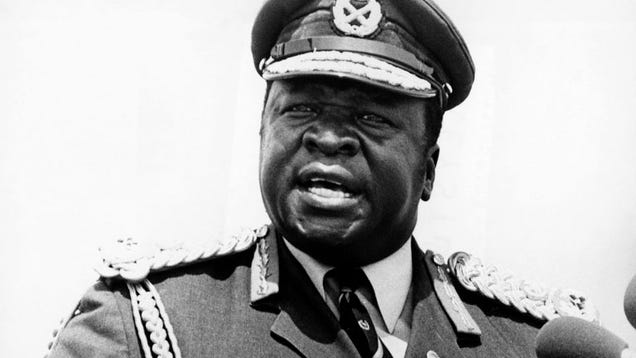Remembering The Day Idi Amin Seized Power In Uganda
TO SEE VIDEO;
On this day in 1971, General Idi Amin Dada named himself the third president of Uganda, a week after leading the military coup that toppled the country's second post-colonial leader, Milton Obote. Charismatic to the public, he proved a cruel, greedy tyrant behind closed doors.
The History Channel breaks it down:
In 1972, he launched a genocidal program to purge Uganda of its Lango and Acholi ethnic groups. Later that year, he ordered all Asians to leave the country, and some 60,000 Indians and Pakistanis fled, thrusting Uganda into economic collapse. A Muslim, he reversed Uganda's friendly relations with Israel and sought closer ties with Libya and the Palestinians. In 1976, he made himself president for life and stepped up his suppression of various ethnic groups and political opponents in the military and elsewhere.In 1978, Amin invaded Tanzania in an attempt to annex the Kagera region and divert attention from Uganda's internal problems. In 1979, Tanzania launched a successful counteroffensive with the assistance of the Uganda National Liberation Front, a coalition of various armed Ugandan exiles. Amin and his government fled the country, and Obote returned from exile to reassume the Ugandan presidency. Amin received asylum from Saudi Arabia. He is believed to have been responsible for the murder of as many as 300,000 Ugandans, though he never stood trial for his crimes.
He ruled until 1979, and died of kidney failure in 2003, having fled Uganda to live out his life in Saudi Arabia (he did make one failed attempt to return, in 1989). For a chilling, insider-y look at his reign, check out Barbet Schroeder's 1974 documentary General Idi Amin Dada (trailer below), which contains extensive interviews with the man himself. He was also portrayed, with Oscar-winning skill, by Forest Whitaker in The Last King of Scotland.
Image via Biography.com.




No comments:
Post a Comment
Please leave a comment-- or suggestions, particularly of topics and places you'd like to see covered